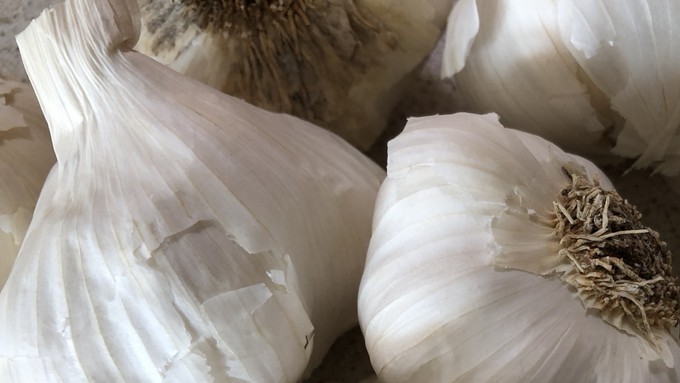
Yolo County master gardeners' monthly talk looks to fall

Planting typically begins in October, but it's good to know ahead of time the types of garlic that are right for the region. Kathy Morrison
If you're up on your Greek myths, you'll remember that Persephone was the daughter of Demeter, goddess of the harvest, and Zeus. Persephone was abducted by Hades, god of the underworld, who after Zeus' intervention permitted her to live "up top" two-thirds of the year, and one-third with him. Demeter is happy and tends the havest, so the story goes, while her daughter is present, but shuts everything down during those months when she's gone.
When our daylight drops below 10 hours per day, we enter what horticulture folks have dubbed the "Persephone Period." In the Sacramento area this year, that period begins on Nov. 19. Daylight will go back above 10 hours on Jan. 22, 2025.
This limitation of daylight may affect human mood and activities somewhat, but it has a profound effect on our plants, especially edibles. Explaining that effect is part of the monthly Kitchen Garden Chat coming this Saturday online with the Yolo County master gardeners.
Master gardener Treva Valentine will also discuss seed saving and tips for garlic ordering. (Many popular varieties sell out, so it's good to have a couple of options.)
The one-hour Zoom workshop begins at 10 a.m. Saturday, Sept. 7. It is open to all interested gardeners. The Zoom link is: https://ucanr.zoom.us/j/98028723763
For more on Yolo master gardener activties, go to https://yolomg.ucanr.edu/
Comments
0 comments have been posted.Sacramento Digs Gardening to your inbox.
Food in My Back Yard Series
May 6: Maintain soil moisture with mulch for garden success
April 29: What's (already) wrong with my tomato plants?
April 22: Should you stock up on fertilizer? (Yes!)
April 15: Grow culinary herbs in containers
April 8: When to plant summer vegetables
April 1: Don't be fooled by these garden myths
March 25: Fertilizer tips: How to 'feed' your vegetables for healthy growth
March 18: Time to give vegetable seedlings some more space
March 11: Ways to win the fight against weeds
March 4: Potatoes from the garden
Feb. 25: Plant a fruit tree now -- for later
Feb. 18: How to squeeze more food into less space
Feb. 11: When to plant? Consider staggering your transplants
Feb. 4: Starting in seed starting
Sites We Like
Garden Checklist for week of May 11
Make the most of the lower temperatures early in the week. We’ll be back in the 80s by Thursday.
* Plant, plant, plant! It’s prime planting season in the Sacramento area. Time to set out those tomato transplants along with peppers and eggplants. Pinch off any flowers on new transplants to make them concentrate on establishing roots instead of setting premature fruit.
* Direct-seed melons, cucumbers, summer squash, corn, radishes, pumpkins and annual herbs such as basil.
* Harvest cabbage, lettuce, peas and green onions.
* In the flower garden, direct-seed sunflowers, cosmos, salvia, zinnias, marigolds, celosia and asters. (You also can transplant seedlings for many of the same flowers.)
* Plant dahlia tubers.
* Transplant petunias, marigolds and perennial flowers such as astilbe, columbine, coneflowers, coreopsis, dahlias, rudbeckia and verbena.
* Keep an eye out for slugs, snails, earwigs and aphids that want to dine on tender new growth.
* Feed summer bloomers with a balanced fertilizer.
* For continued bloom, cut off spent flowers on roses as well as other flowering plants.
* Add mulch to the garden to maintain moisture. Mulch also cuts down on weeds. But don’t let it mound around the stems or trunks of trees or shrubs. Leave about a 6-inch-to-1-foot circle to avoid crown rot or other problems.
* Remember to weed! Pull those nasties before they set seed.
* Water early in the day and keep seedlings evenly moist.